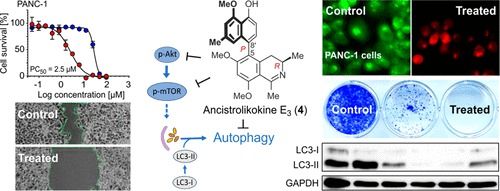PANC-1 human pancreatic cancer cells are characterized by their ability to proliferate aggressively under hypovascular and hypoxic conditions in the tumor microenvironment, displaying a remarkable tolerance to nutrition starvation. The antiausterity strategy is a new approach in anticancer drug discovery aiming at the identification of potent agents that inhibit preferentially the survival of tumor cells during a limited supply of nutrients and oxygen. The new 5,8′-coupled naphthyldihydroisoquinoline alkaloid ancistrolikokine E3 (4), isolated from the Congolese liana Ancistrocladus likoko, showed potent preferential cytotoxicity against PANC-1 cells under nutrient-deprived conditions, with a PC50 value of 2.5 μM, without exhibiting toxicity in normal, nutrient-rich medium. The compound was found to induce dramatic alterations in cell morphology, leading to cell death. Moreover, it inhibited significantly PANC-1 cell migration and colony formation in a concentration-dependent manner. This study on 4 provides the first live evidence of the effect of a naphthyldihydroisoquinoline alkaloid against PANC-1 cells in nutrient-deprived medium. Mechanistic investigations conducted suggest that compound 4 is a potent inhibitor of the activation of the Akt/mTOR pathway. Furthermore, it inhibited the expression levels of the key autophagy regulators Atg5, Atg12, Beclin-1, LC3-I, and LC3-II. The results demonstrated that ancistrolikokine E3 (4) is a potent early-stage inhibitor of the autophagy pathway in PANC-1 human pancreatic cancer cells. Ancistrolikokine E3 (4) and related naphthylisoquinoline alkaloids are promising potential lead compounds for anticancer drug development based on the antiausterity strategy.
Ancistrolikokine E3, a 5,8′-Coupled Naphthylisoquinoline Alkaloid, Eliminates the Tolerance of Cancer Cells to Nutrition Starvation
Posted in biotech/medical
Read more
